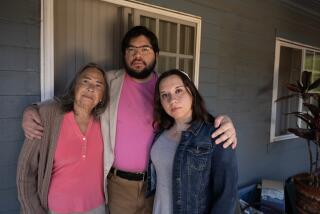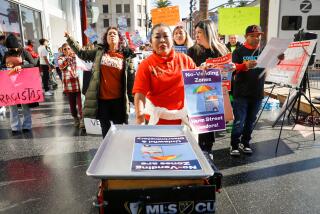Vendors Shouldn’t Have to Buy Safety
News that the Los Angeles Police Department will begin high-profile foot patrols in a Pico-Union neighborhood is welcome indeed, but hardly a real solution to the intolerable extortion occurring there.
Dozens of street vendors, peddling everything from corn on the cob to Christmas decorations along 6th Street, have been forced to pay as much a $10 each weekend in “protection money” to members of a gang that controls the area. Vendors have been afraid to complain to police because street vending is illegal in Los Angeles and because many vendors are illegal immigrants.
That fear has played right into the pockets of the 18th Street gang, regarded as one of the city’s largest and most notorious. Gang members have boldly spray-painted slashes along the sidewalk, each with a number, marking the stalls of individual vendors. The strong-armed collections of between $4 and $10 weekly, what one vendor called “rent,” began about five months ago. Collections observed by Times staffers appeared to take place without resistance from the vendors. Police reported that no one had complained to them about the practice, which some said had spread to conventional businesses in the area.
But Monday, following a Times account of these collections, the LAPD announced that one merchant finally did come forward, triggering the foot patrols beginning next weekend. Police hope that patrol officers “can establish a rapport” with the street vendors and “let them know that they can come forward.” Perhaps, but the patrols will also compound the legal limbo in which street vendors find themselves.
In January, the City Council approved a plan to legalize and regulate sidewalk sales in designated areas. However, a draft ordinance has yet to come back to the council for final approval. Without that ordinance, street vending remains illegal and merchants will understandably still fear going to the police, even if they are victimized by gang members. Enactment of this ordinance is long overdue and will help clear away some of the legal cloud hanging over these merchants.
But there are broader forces at work on 6th Street as well. International pressures have brought many poor immigrants to the city with little economic opportunity save street vending. And social and economic pressures have lured too many young men into violent street gangs. These forces play out daily on the sidewalk along 6th Street but their solution lies far beyond the control of the curbside taco chefs and watch peddlers. The problems of 6th Street are those not likely to be remedied by a city ordinance; these are problems for which there are only long-term, national solutions.
More to Read
Sign up for Essential California
The most important California stories and recommendations in your inbox every morning.
You may occasionally receive promotional content from the Los Angeles Times.









